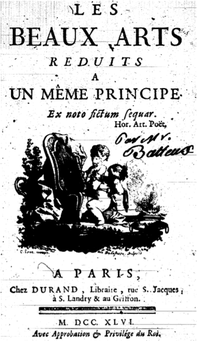Charles Batteux
Charles Batteux , called Abbé Charles , (born May 6, 1713 in Alland'huy near Vouziers , Département Ardennes , † July 14, 1780 in Paris ) was a French esthete .
Live and act
After finishing school, Batteux began to study theology at the University of Reims . By completing the program, he was appointed canon of the Cathedral of Reims . As such, he was appointed to the Collège de Lisieux (Paris).
As "Prof. the rhetoric and humanities "entrusted to Batteux in 1750 with a teaching position at the Collège Royal (Paris); later he taught there “Greek and Roman philosophy”.
In 1754 Batteux became a member of the Académie des Inscriptions et Belles-Lettres and in 1761 he was admitted to the Académie française as the successor to Odet-Joseph Giry (1699–1761) (Fauteuil 31).
reception
As the founder of a new French philosophy of art, Batteux regarded the principles of French classical music as having been overcome. In his opinion, artists should not orientate themselves on art, but on nature. They should not primarily reproduce the classical works, but real life (and thus also the creatural expressions of people who were frowned upon in the classical period).
Batteux justified this view through his interpretation of the poetics of Aristotle : “Imitate nature”. Batteux paved the way for numerous artists and intellectuals who wanted to break away from the authoritarian ideas of French absolutism , above all Jean-Jacques Rousseau with his motto “Back to nature”.
With his work Les beaux-arts réduits à un même principe (The fine arts traced back to a uniform principle, 1747), he tried to make imitation of nature a common basic principle of all arts - at least in the sense of vraisemblance : the action must be probable, credible ; the people's conflicts must correspond to their social status. This caused him (like Corneille ) some difficulties for literature and even more for music, but it convinced many contemporaries.
The writing Cours de belles lettres ou principes de la littérature after the Epistola ad Pisones des Horace caused a stir among France and Germany's art theorists . In this book, Batteux defined the drama-poetic principle of the height of fall . The 45 volumes of the Cours d'études à l'usage des élèves de l'École royale militaire, commissioned by the Count of Saint-Germain and produced jointly with Étienne-Maurice Chompré, Jean Ferdinand Monchablon and Philippe de Prétot a compilation .
Works
- Cours d'études à l'usage des élèves de l'Ecole royale militaire . Paris 1751 (45 vols., Together with Pierre Chompré, Jean Ferdinand Montchablon and Philippe de Prétot).
- Limitations of the fine arts to a single principle (“Les beaux-arts réduits à un même principe”). Weidmann & Reich, Leipzig 1770 (translation by Johann Adolf Schlegel ).
- History of the philosophers' opinions on the first basic causes of things ("Histoire des causes premiéres"). Halberstadt 1792 (2 vols., Translation by Johann Jakob Engel ).
- Mémoires concernant l'histoire, les sciences, les arts, les moeurs et les usages des Chinois . Paris 1776–1789 (15 volumes, together with Louis-Georges de Bréquigny and Joseph de Guignes ).
-
Cours de belles lettres ou principes de la littérature . Paris 1747–1750 (5 vols., Translation by Karl Wilhelm Ramler as an introduction to the beautiful sciences , Leipzig 1756–1758)
- Digitized version of the 1st edition 1756–1758: Vol. 1 , Vol. 2 , Vol. 3 , Vol. 4 in the Google book search.
- Digitized version of the 2nd edition 1762–1763: Vol. 1 , Vol. 2 , Vol. 3 , Vol. 4 in the Google book search.
- Digitized version of the 3rd edition in 1769: Vol. 1 , Vol. 2 , Vol. 3 , Vol. 4 in the Google book search.
- Digitized version of the 4th edition in 1774: Vol. 1 , Vol. 2 , Vol. 3 , Vol. 4 in the Google book search.
- Digitized Vienna edition 1770–1771: Vol. 1 , Vol. 2 , Vol. 3 , Vol. 4 in the Google book search.
- The moral of Epicurus ("La morale d'Epicure"). Halberstadt 1792 (translation by Johann Gottfried Bremer).
- Les poésies de Horace . Paris 1768 (2 vols.).
- Lettres sur la phrase française comparée avec la latine. 1748
literature
- Herbert Dieckmann: The change of the concept of imitation in the French aesthetics of the 18th century . In: Hans Robert Jauß (Ed.): Imitation and Illusion . Fink, Munich 1991, ISBN 3-7705-0309-0 , pp. 28-59 (reprint of the Munich 1969 edition).
- Irmela von der Lühe: Nature and Imitation. Investigations on the Batteux reception in Germany . Bouvier, Bonn 1979, ISBN 3-416-01462-6 .
- Ludwig Tavernier: L'imitation de la belle nature. To understand the artist in Charles Batteux's theory of imitation. In: sensation and reflection. An 18th century problem. Edited by Hans Körner, Constanze Peres, Reinhard Steiner, Ludwig Tavernier (Munich contributions to the history and theory of the arts, 1), Olms: Hildesheim, Zurich, New York 1986, pp. 49–98.
- Friedrich Vollhardt : The basic rule of taste. On the theory of nature imitation by Charles Batteux and Georg Friedrich Meier . In: Theodor Verweyen (Ed.): Poetry theories of the early enlightenment . Niemeyer, Tübingen 1995, ISBN 3-484-81001-7 , pp. 26-36.
Web links
- Literature by and about Charles Batteux in the catalog of the German National Library
- Short biography and list of works of the Académie française (French)
Individual evidence
- ↑ Dezobry et Bachelet: Dictionnaire de biographie. t.1, Ch.Delagrave 1876, p. 238
| personal data | |
|---|---|
| SURNAME | Batteux, Charles |
| ALTERNATIVE NAMES | Batteux, Abbé Charles |
| BRIEF DESCRIPTION | French esthete |
| DATE OF BIRTH | May 6, 1713 |
| PLACE OF BIRTH | Vouziers , Ardennes department |
| DATE OF DEATH | July 14, 1780 |
| Place of death | Paris |
